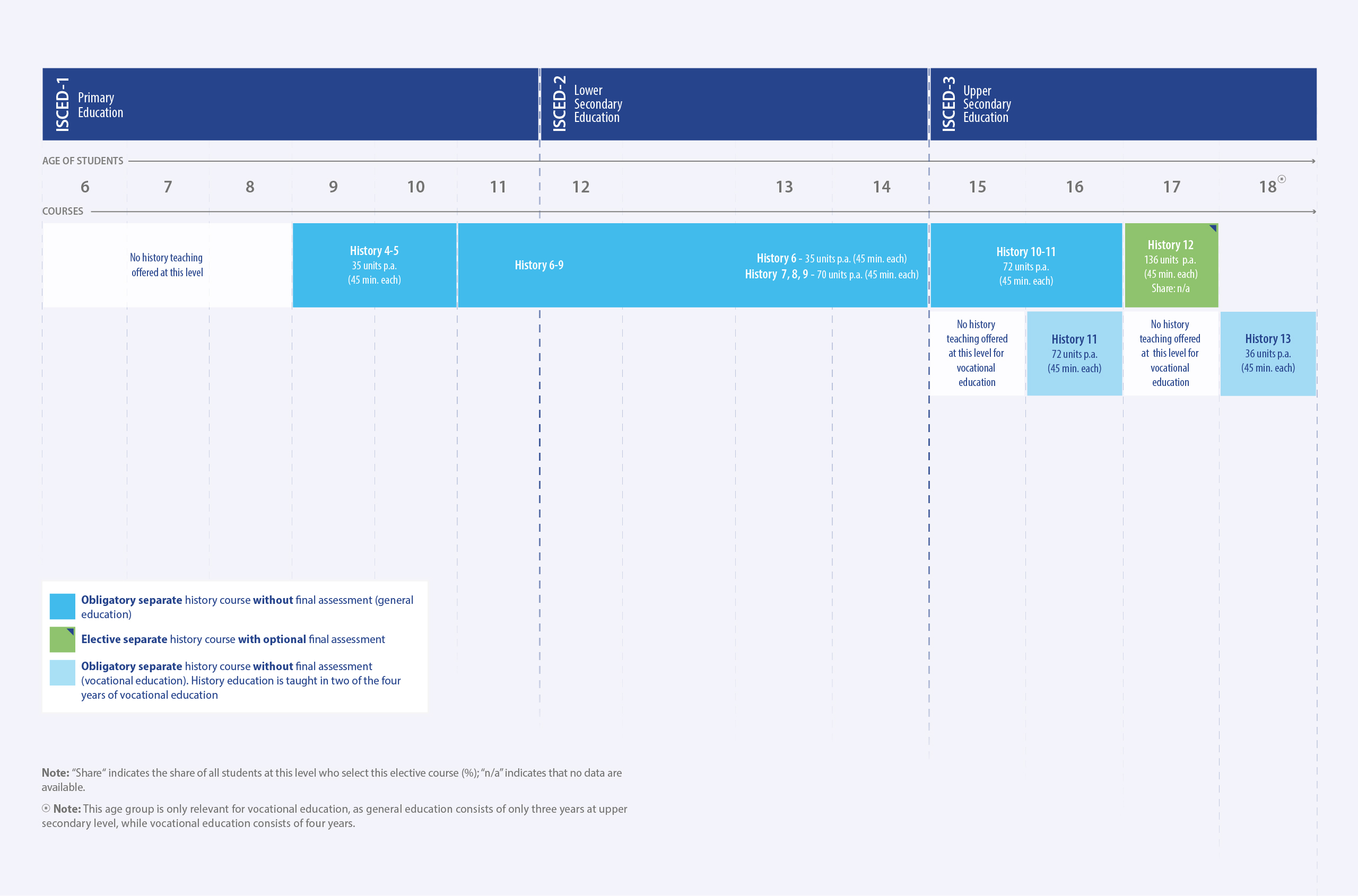
OVERVIEW
In Albania, history is taught as a standalone subject in primary and secondary education starting from the fourth grade (pupils aged 9). It remains a compulsory subject until the third year of upper secondary education and becomes optional in the final year of public schooling. History is also a compulsory subject in two of the four years of vocational education.
The history curriculum is national, chronological, thematic, and competence-based. The Ministry of Education, Sports, and Youth is responsible for developing and overseeing the history curricula, with support from other state educational agencies. Privately administered schools generally follow the state curricula, though Albanian language and History are mandatory subjects in these schools. Civil society organisations and minority groups are involved in the curriculum development process, and the histories of minority groups, such as Roma history, are included in the curriculum.
Assessment methods are diverse, including essays, oral exams, and project work. The final exam in history, which is optional, is taken only at the end of the optional final-year history course. Teachers select textbooks from government-approved options and have the freedom to use additional materials. To teach history, teachers must hold a master's degree and pass a national certification test, and they are required to undergo regular professional development.

Download high-resolution schematic
FURTHER INSIGHTS

HISTORY IN SCHOOL
Students begin taking the compulsory course “History” in grade 4 (age 9). This remains compulsory throughout lower and secondary education until the penultimate year of public schooling. In the final year, it becomes an elective subject for which students can opt to take a final assessment. Students in vocational secondary education are required to take “History” in the second and fourth years of their programme (ages 16 and 18).
Private schools are required to teach Albanian language, literature, history and geography in the Albanian language, according to the law governing pre-university education. Schools for the education of students from the Greek and North Macedonian minorities additionally teach the history of those countries in their respective languages.

HISTORY CURRICULUM
Albania has a centralised education system with curricula prescribed at the national level. The Ministry of Education, Sports and Youth is responsible for the state school curricula. Other authorities responsible for state school curricula include the Quality Assurance Agency in Pre-University Education, the Educational Services Centre, the General Directorate of Pre-University Education, regional education directorates and local education offices. The education authorities reported that civil society organisations also participate in curriculum development. Albania is among the OHTE member states who reported that representatives of minority groups are involved in curriculum design.
The organisation of history curriculum is chronological, thematic and competence-based. The education authorities report that both civil society organisations and minority groups participate in curriculum development.
|
AIMS REPRESENTED “VERY WELL” OR “QUITE WELL” IN THE CURRICULUM |
PERIODS |
GEOGRAPHICAL SCOPE |
APPROACHES |
|
|
|
|
The authorities report that minority groups (cultural, ethnic, linguistic, national, religious or sexual/gender) including Roma and Travellers, are included in the history curriculum.
Curricula workstation by GEI (History curricula search by country)
Agency for Quality Assurance in Pre-University Education (Responsible for drafting the curricula for all stages of education)

ASSESSMENT AND EXAMS
The assessment methods teachers are required to use are essays, oral examinations, knowledge-based questions, source-based questions, multiple-choice questions and project work.
End-of-stage examinations are taken only at the end of the optional final-year upper secondary course “History 12” as part of the state matura. The examinations are set at the national level.
End-of-stage examinations assess historical content knowledge, historical thinking competences (e.g., critical analysis and evaluation of evidence, formulation and justification of historical arguments, consideration of different perspectives), social and civic competences (e.g., conflict resolution skills, demonstrating empathy, respect for diversity), generic skills (e.g., communication, co-operation, use of ICT).
End-of-stage examinations are written and include open-ended questions, close-ended questions and multiple-choice questions.

TEXTBOOKS AND OTHER RESOURCES
Following a curricular reform, a special commission set up by the Ministry of Education approves three textbooks per subject, including history, from which teachers are able to choose one to use in their class(es). Teachers also have the freedom to use other materials.
In general, materials besides textbooks are not licensed by the Albanian government.
Policies on the use of different types of educational resources are as follows:
|
|
|
International TextbookCat (GEI collection of Textbooks and Educational Media)

HISTORY TEACHERS AND THEIR EDUCATION
To teach history, teachers must be certified with a master’s-level university degree (licence). The licence is obtained through a nationally standardised test.
Teachers must be recruited via a national test offered online on the Teachers for Albania platform. The test, organised by the Educational Services Centre (QSHA), contains scientific questions and teaching methodology. Those who achieve the highest scores in the test start working at a school for one year without an employment contract. After one year of work, the school director makes an evaluation of the teacher and recommends whether they be appointed to the school.
At the primary level, teachers are trained more generally to teach across a range of subjects. At the secondary level, teachers are trained primarily or exclusively as history teachers.
At least 18 hours of in-service professional development training over three days a year is obligatory. Nine hours of this consist of direct or remote (online) training sessions and the remaining nine hours of individual work by participants to prepare tasks. Teachers can choose courses from a list of modules accredited by the Accreditation Commission of Training Programmes (KAPT), according to their priorities and needs for professional development. The Ministry of Education and the Quality Assurance Agency in Preuniversity Education (ASCAP) offer free training programmes for priorities in education.
Albanian Association of History Teachers “Youth and History” (presentation by EuroClio)
The information in the sections above is an excerpt of the thematic and general data presented in the following OHTE publications:
2022: Pandemics and natural disasters as reflected in history teaching
2023: OHTE General Report on the State of History Teaching in Europe


